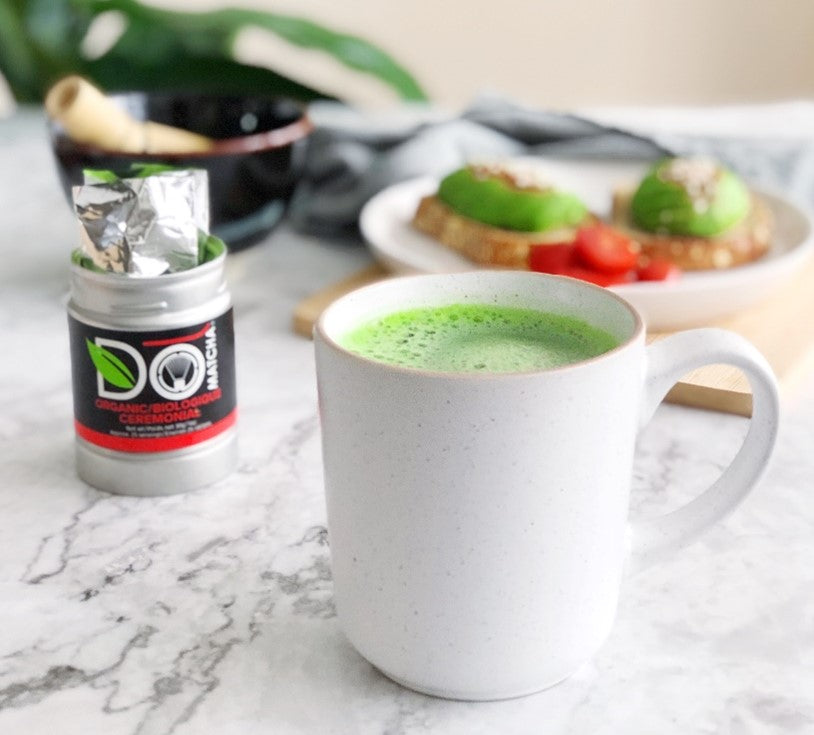
To Get Full Matcha Tea Benefits, Avoid These Products
Share
Matcha has attracted much attention in recent years in the northern hemisphere. With its origins in Japan, matcha is produced from tencha green tea leaves. Matcha is traditionally consumed as a tea but has been integrated into various popular recipes. It might be tempting to jump on the matcha train to reap the abundant health benefits widely advertised. However, consumers should be wary of the difference between authentic matcha and pseudo products.
How can you tell if matcha is authentic?
Authentic, high-quality matcha looks and tastes different than lower-quality tea blends. Authentic matcha should only contain one ingredient—100% tencha green tea leaves. In its purest form, matcha made from tea leaves from well-producing regions in Japan should render a delightful aroma and a vibrant green shade.

Conversely, matcha powder made from a blend of tea leaves that don’t come out of reputable tea regions in Japan will often show itself through a duller, army green shade. It often tastes bitter, so companies will likely mask it with natural flavours and sugar.
Does matcha powder mixed with other ingredients impact its benefits?
Because matcha has become a buzzword in the culinary world, many companies like to come out with iterations of their product with the phrase “matcha” in their product name. We see this often with ready-to-drink superfood powders, which have become increasingly popular.
Watch out for mixed products “containing matcha” and touting the health benefits of matcha in their advertising. To get maximum efficiency from matcha, we must ingest matcha in its purest form and from reputable tea producers.
At Domatcha, we take pride in our strong, 15-year relationship with our tea producer partners in Japan, and our 16th Generation tea master, Handa-san. We are hypercritical about quality and want to ensure that every tin of Domatcha delivers consistent excellence to our matcha-loving customers.

Organic doesn’t always cut it
Companies have found ways to capitalize on the growing desire for organic goods. Often you’ll see companies release formulations that contain ‘organic’ matcha yet give little indication of where the matcha is produced. And you’ll be hard-pressed to find a mixed formulation where the matcha powder has a bright green hue. Be wary of products labelled as ‘organic’ matcha if it doesn’t specify where the tea leaves are grown because you might be led into buying something that’s a lower grade or bulk matcha.
Even if a matcha product is sweetened with a natural sweetener like stevia, this will already tell you that the product lacks the natural, subtle sweetness of authentic matcha. Authentic matcha should never have to be sweetened to mask the bitter taste and be smooth and balanced on the palette.

DōMatcha® is completely clean and additive-free. All matcha (organic and non-organic) products are tested by an independent lab. We can guarantee no detectable residual chemicals from pesticides, herbicides, fungicides, or radiation. Once the tins arrive in our warehouse in Canada, they are tested again to ensure quality and safety.
You shouldn’t have to play detective
If you’re struggling to find the information you want on a matcha product, chances are there’s not much to find. Transparent labelling helps us understand exactly where that product comes from. Companies that aren’t great with transparent labelling are most likely trying to hide the fact that their product isn’t very authentic, and they’re unable to prove that the matcha is 100% sourced from Japan.
When you pick up a Domatcha tin, for example, there’s no question of what’s in the tin—100% Japanese-grown tea leaves. The Domatcha organic line is certified internationally and kosher, clearly labelled.
Ceremonial is your best bet

Ceremonial matcha, as its name implies, is consumed in traditional Japanese tea ceremonies, appraising its superior quality. Ceremonial-grade matcha will always be of higher quality, so if you’re going with another matcha brand, at least choose the ceremonial variety for the best experience. The ceremonial grade matcha from Domatcha is one of the reigning bestsellers for its sweet and clean flavour, suited for everyday taste.
Conclusion
With any saturated product, there will be many dupes or inauthentic variations on the market. It’s not always easy for consumers to navigate this environment. Remember that quality often comes at a higher cost, but the health benefits and flavour can make it well worth it for many. Often, lower-quality matcha ends up going to waste simply because it lacks flavour.